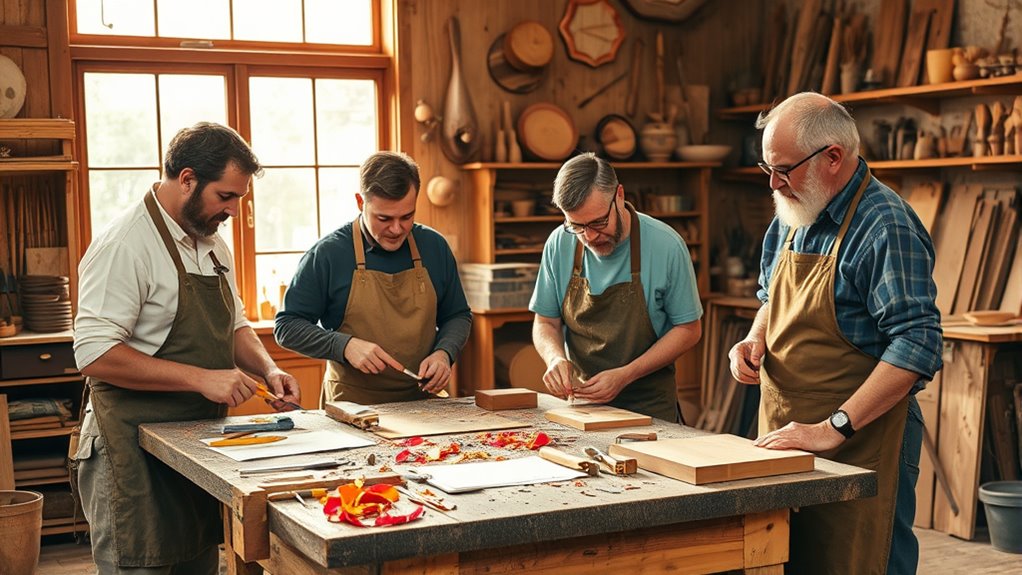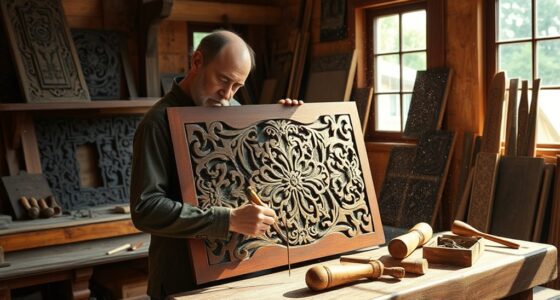Woodnbits collaborates with artisans worldwide by sharing skills, promoting cultural preservation, and ensuring ethical practices. You’ll see them develop long-term partnerships that support community empowerment and economic growth. They facilitate knowledge exchange through workshops and storytelling, fostering innovation and traditional craftsmanship. By building networks and supporting fair trade, Woodnbits helps artisans sustain their skills and heritage. To explore how these efforts create meaningful social impact, keep exploring their approach.
Key Takeaways
- Woodnbits partners with artisans in Honduras to support skill sharing and cultural preservation through collaborative projects.
- They conduct workshops and virtual skill exchanges to develop a shared vocabulary of techniques and foster innovation.
- Woodnbits connects artisans via digital platforms for ongoing dialogue, mentorship, and joint marketing efforts.
- They promote fair trade practices by ensuring fair compensation and sustainable sourcing in collaborations.
- Woodnbits facilitates storytelling and cultural exchanges to expand market reach and strengthen artisan networks.
Building Partnerships Rooted in Shared Values
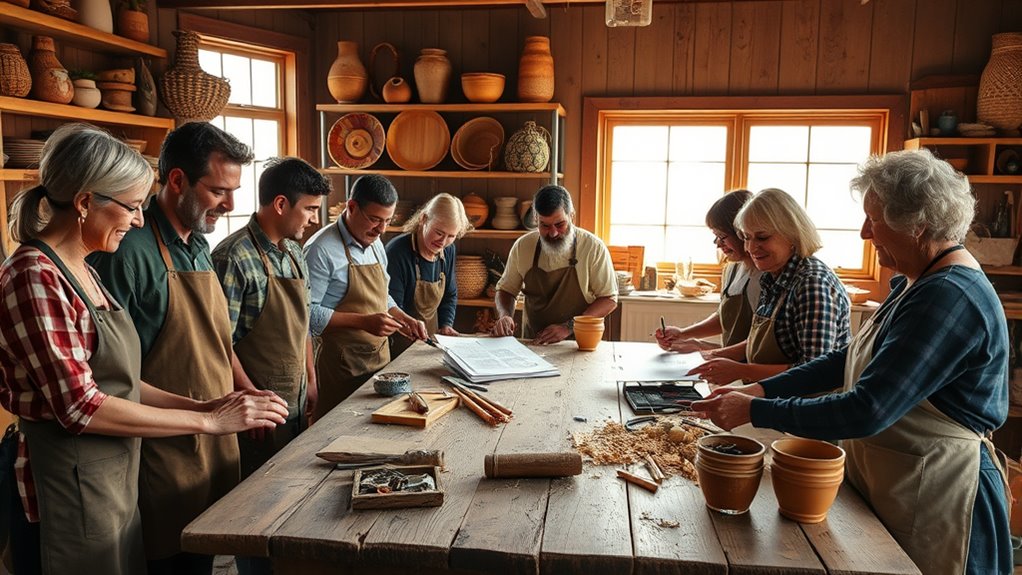
Building partnerships rooted in shared values requires a genuine commitment to common principles. Tell us, when you work with artisans from the United States or Honduras, aligning your goals around social justice and sustainability makes a real difference. WoodnBits collaborates with Lazarus Artisan Goods in Honduras, supporting local women through skill-sharing and economic empowerment. These partnerships focus on creating handcrafted wooden boards that honor cultural heritage while practicing ethical production. By fostering long-term relationships, both parties aim for mutual growth and capacity building within artisan networks. This approach aligns with their mission to promote equitable trade and amplify marginalized voices through craft. When shared values guide your collaborations, you build trust and ensure that every product reflects a deeper commitment to community development and social impact. Incorporating ethical production practices can help strengthen communication and understanding in such partnerships, making them more resilient and effective. Engaging in cultural sensitivity is also essential to respect and preserve the unique traditions that artisans bring to their craft. Emphasizing emotional intelligence within these collaborations can further enhance mutual respect and collaboration, fostering a supportive environment for all involved. Effective collaboration techniques are essential for sustaining such meaningful partnerships, especially as they relate to ethical production practices in diverse cultural contexts.
Facilitating Knowledge and Skill Exchange

By sharing techniques and methods, you can help artisans learn new skills and improve their craft. Building collaborative networks encourages ongoing knowledge exchange and innovation. These partnerships enable artisans to adapt traditional practices for modern markets while preserving their cultural heritage. Engaging with other artisans can also foster creative problem-solving, leading to the development of unique and innovative products. Incorporating sustainable materials and environmentally friendly techniques further enhances the appeal and relevance of artisan products in today’s eco-conscious market. Additionally, embracing technological advancements can open up new avenues for artisans to showcase and sell their work globally. Moreover, fostering interdisciplinary collaborations can lead to groundbreaking approaches that blend different artistic styles and techniques, supported by architectural solutions that facilitate such innovative exchanges.
Sharing Techniques and Methods
Sharing techniques and methods among artisans creates a dynamic exchange that elevates craftsmanship across regions. When you collaborate with others, you gain access to detailed insights into woodworking joinery, finishing, and tool use, like jigsaws, lathes, and chisels. These shared practices help refine your skills and improve your work’s quality. Artisans often hold workshops—virtually or in person—to demonstrate carving patterns or applying natural stains, making knowledge transfer more effective. Through these exchanges, a shared vocabulary of techniques develops, fostering consistency and inspiring innovation. Regular dialogue and documentation ensure traditional skills are preserved while integrating innovative tools and methods that can significantly enhance craftsmanship. This ongoing sharing process not only enhances individual craftsmanship but also drives collective growth within the artisan community. Additionally, adopting tuning techniques from automotive culture can inspire new approaches to craftsmanship and problem-solving in woodworking projects. Moreover, emphasizing sustainable practices in material selection and finishing methods can contribute to environmentally responsible craftsmanship. Incorporating modern digital tools such as 3D modeling software can further expand creative possibilities and precision in woodworking designs. Developing standardized techniques across regions can also help maintain high quality and facilitate training new artisans efficiently.
Building Collaborative Networks
Collaborative networks play a pivotal role in advancing craftsmanship by connecting artisans from different regions and backgrounds. You can see how WoodnBits fosters these connections through workshops, joint projects, and mentorship programs. These initiatives allow experienced artisans to share their skills with emerging craft practitioners, promoting skill transfer in techniques like marquetry, joinery, and finishing. By encouraging ongoing dialogue and cooperation, WoodnBits helps artisans learn from each other, incorporate diverse cultural styles, and adopt sustainable practices. This collaboration not only enhances craftsmanship quality but also stimulates innovation. As a result, artisans strengthen their communities, preserve traditional trades, and boost economic development. Building these networks creates a vibrant, interconnected craft ecosystem that benefits everyone involved. Networking opportunities facilitate continuous learning and growth within the artisan community, fostering a collaborative culture that sustains craftsmanship across generations. Additionally, implementing digital communication tools can expand these networks beyond local borders, enabling artisans to connect and share knowledge globally. Incorporating traditional techniques into these collaborations helps preserve cultural heritage while inspiring new creative expressions. Furthermore, integrating knowledge sharing practices ensures the transfer of skills and innovations across generations, securing the longevity of artisanal crafts.
Supporting Economic Empowerment and Community Development
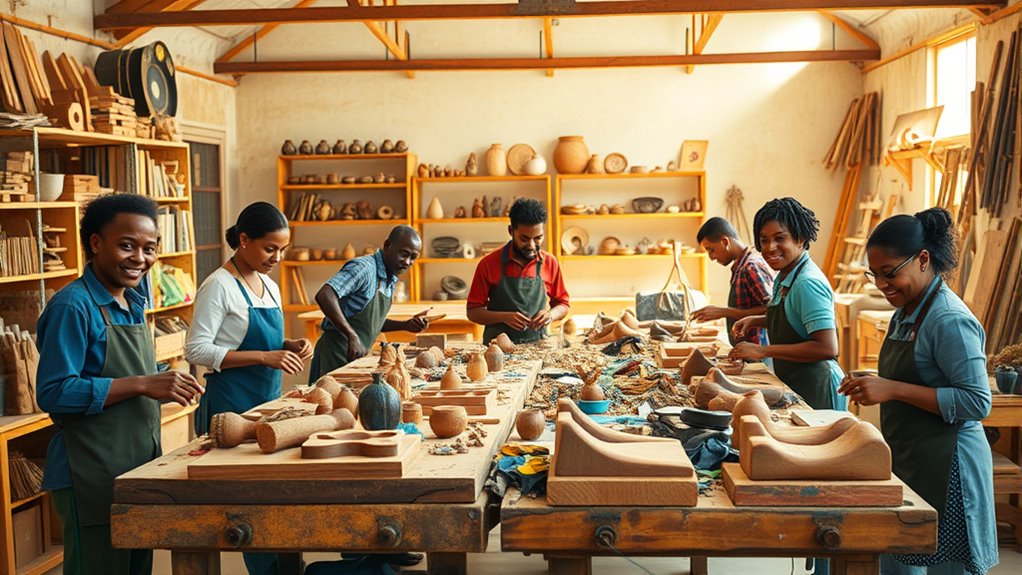
Supporting economic empowerment and community development, WoodnBits actively partners with local artisans to incorporate their handcrafted wood products into broader markets. By doing so, you help create new opportunities for artisans to sell their work, boosting their income and financial independence. Your collaborations also promote skill development and knowledge exchange, allowing artisans to refine their craft and expand their marketability. WoodnBits emphasizes fair pay and sustainable practices, ensuring artisans benefit both socially and economically. Showcasing artisan-made items raises awareness about community initiatives and the importance of ethical sourcing. These efforts foster long-term economic growth and social justice, empowering artisans to build resilient communities. Your support helps sustain traditional crafts while fostering community resilience and shared prosperity.
Promoting Cultural Preservation Through Collaboration

By partnering with artisans from different backgrounds, you help share and preserve traditional techniques that define their cultural heritage. These collaborations keep indigenous crafts alive and relevant in today’s markets. Through this work, you support the transmission of cultural practices to future generations, strengthening community identity. Engaging with traditional techniques ensures the continued vitality of unique craftsmanship.
Sharing Traditional Techniques
When artisans from Honduras share their traditional woodworking techniques with WoodnBits, they help keep cultural craftsmanship alive. You get to see firsthand how skills like marquetry, carving, and natural staining are rooted in regional traditions. These collaborations allow you to learn about specific hand tools, joinery methods, and finishing techniques unique to each community. As artisans exchange knowledge, they preserve these time-honored practices within modern craft projects. Documenting and sharing these methods guarantees that traditional skills aren’t lost over time. Working together, WoodnBits and their partners celebrate authentic techniques, integrating them into contemporary handmade products. This approach not only maintains cultural integrity but also enriches your appreciation for craftsmanship rooted in history and tradition. Additionally, engaging in collaborative learning fosters a deeper understanding of regional techniques and ensures their transmission to future generations. Incorporating traditional craftsmanship into modern designs highlights the value of sustainable and culturally rich practices, which can also be supported by cultural preservation efforts.
Sustaining Cultural Heritage
Collaborations like those between WoodnBits and regional artisans play a crucial role in preserving cultural heritage. When you work with artisans from places like Honduras, you help keep traditional woodworking techniques alive. Sharing tools and skills ensures that authentic practices aren’t lost over time. By supporting local artisans, you enable the continued production of handmade pieces that carry cultural significance. These partnerships also facilitate the transfer of knowledge across generations, strengthening regional craftsmanship. When you elevate artisan stories and highlight their work, you promote cultural resilience. Your collaboration helps sustain unique regional identities, ensuring that these traditions remain vibrant and relevant. In doing so, you’re not just creating beautiful wood items—you’re actively conserving a vital part of cultural history for future generations.
Amplifying Social Impact Through Collective Action
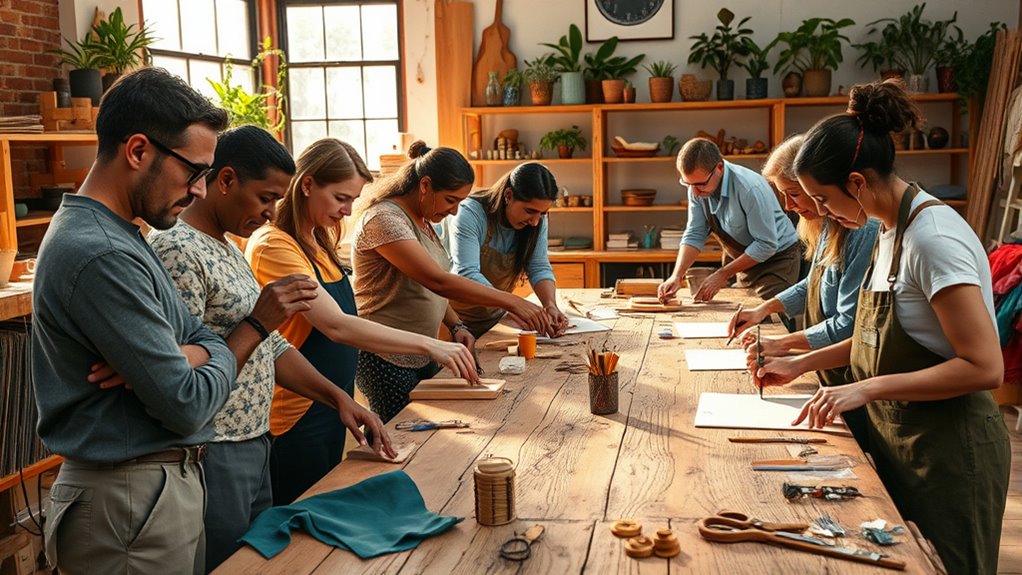
Collective action amplifies social impact by harnessing the combined skills, resources, and cultural knowledge of diverse artisans and organizations. When you collaborate with artisans like Lazarus Artisan Goods in Honduras, you help create handcrafted wood products that support economic development and social justice. This teamwork boosts community empowerment and sustainable livelihoods for marginalized groups. Sharing expertise and resources results in higher-quality products and raises awareness of social issues. Your partnerships also increase visibility and funds for artisan communities, advancing global efforts against poverty, trafficking, and exploitation. By working together, you demonstrate how collaborative craftsmanship promotes reconciliation and social change across borders.
| Partnership | Focus | Impact |
|---|---|---|
| WoodnBits & Lazarus | Craftsmanship | Economic growth |
| Artisan Skills | Knowledge sharing | Product quality improvement |
| Social Justice | Community support | Poverty reduction |
| Cultural Knowledge | Preservation | Social awareness |
| Global Outreach | Visibility | Broader social impact |
Navigating Challenges and Opportunities in Artisanal Networks

Managing challenges and opportunities in artisanal networks requires careful balancing of ethical practices, quality standards, and market access. You need to guarantee fair compensation for artisans like Lazarus Artisan Goods while maintaining high quality across diverse collaborations. Building ongoing communication and trust is essential to address these challenges effectively. Opportunities emerge through shared storytelling and cultural exchanges, allowing artisans to showcase their craftsmanship and expand their market reach via joint marketing efforts. Establishing transparent supply chains helps prevent exploitation and promotes sustainability, addressing ethical concerns. Additionally, collaborative networks boost resilience by encouraging skill development and resource sharing. This collective approach enables artisans to adapt to market fluctuations, innovate, and grow, ultimately strengthening the artisanal community and enriching product offerings for consumers.
Frequently Asked Questions
What Type of Art Is Woodworking?
Woodworking is a versatile art form that combines craftsmanship and creativity. You shape, carve, and assemble wood to make functional or decorative objects, showcasing your skill and artistic expression. Whether you focus on furniture, sculptures, or intricate details like marquetry, you’re practicing a craft that reflects cultural traditions and personal style. Your work involves techniques like joinery and carving, transforming raw wood into beautiful, meaningful pieces.
What Wood Is Not Good for Cutting Boards?
Thinking about your cutting board is like choosing the right tool for a delicate task. Woods that aren’t good for cutting boards include soft woods like pine or cedar because they scratch easily and can transfer odors. Also, woods prone to warping, splitting, or containing natural toxins aren’t safe or durable. You should avoid these to keep your food safe and your knives sharp, ensuring a hygienic, long-lasting surface.
What Cutting Boards Do They Use in Restaurants?
You’ll find that restaurants often use large, sturdy cutting boards made from durable, food-safe hardwoods like Guanacaste. These boards are typically handcrafted by artisans to meet strict hygiene and durability standards. Popular sizes include the Wide and Long options, which provide versatility for different kitchen tasks. Using these artisanal boards not only guarantees quality and safety but also adds a unique, aesthetic touch to the restaurant’s presentation.
Can Wood Be Used in Craft in Art?
Yes, you can definitely use wood in craft and art. It’s a versatile material that lends itself well to carving, burning, and inlay work. You can choose different types of wood for their unique textures and colors, creating detailed sculptures or functional objects like jewelry and furniture. Your creativity is the limit—wood’s natural properties make it ideal for expressing your artistic vision in many innovative ways.
Conclusion
By partnering with other artisans, you can turn your craft into a force for incredible change. These collaborations don’t just build beautiful products; they ignite a movement that can transform communities and preserve cultural heritage. When you work together, your impact multiplies exponentially—like setting off a ripple effect that reaches far beyond your expectations. Embrace these partnerships, and watch as your shared passion creates a legacy that’s truly legendary.
